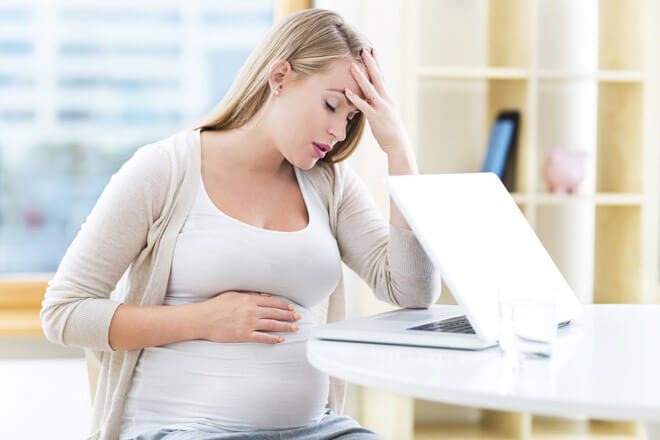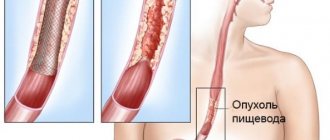During the long nine months of pregnancy, a happy woman has to go through a lot. Often problems begin from the very beginning, testing the expectant mother's strength. And, oddly enough, one of these tests may be discomfort in the stomach.
It seems like you don’t eat to your heart’s content and don’t overindulge in heavy foods, but your stomach hurts and is bloated, as if you had swallowed a ball. At the same time, other unpleasant sensations and symptoms can be annoying, which are combined into a disappointing diagnosis - toxicosis.
How to understand that it is the stomach that hurts - the main symptoms and classifications of pain
The question of why the stomach hurts during pregnancy requires a detailed answer.
Let's start with the main reason: during pregnancy, the functioning of the gastrointestinal tract necessarily changes. This is due to physiological factors - in particular, the influence of the neuroendocrine system.
The hormone progesterone weakens the tone of smooth muscles, as a result of which food, entering the stomach and then the intestines, passes through the digestive tract much more slowly than in normal conditions.
For this reason, there is a feeling that the intestines and stomach are not working during pregnancy (“the stomach stopped and stood up,” expectant mothers say). It actually works, just much slower.
Muscle relaxation causes constipation, discomfort, sometimes nausea and severe pain in the stomach itself and various parts of the intestines.
Muscle failure in the anterior parts of the digestive system and in particular in the area of the cardiac sphincter (separates the esophagus and stomach) provokes the reflux of food from the stomach back into the esophagus, which causes heartburn, esophagitis and symptoms of gastritis.
In addition, the uterus increases in size as the fetus grows and puts more and more pressure on the stomach and intestines , since all these organs are located in close proximity to each other. This causes pain and a feeling of tightness in the stomach.
It is not uncommon to experience stomach cramps or something similar during pregnancy. The digestive organs are displaced under the pressure of the fetus and are forced to adapt to new working conditions.
Hormonal changes also contribute to loosening of the gastric mucosa and changes in acidity levels due to a decrease in the amount of gastric juice.
Stomach diseases that can occur or worsen during pregnancy are also quite diverse:
- gastritis;
- cholecystitis;
- colitis of various origins;
- inflammation of the pylorus of the stomach and mucous membrane;
- peptic ulcer of the stomach and duodenum;
- pancreatitis (inflammation of the pancreas);
- duodenitis;
- atony (decreased contractility of the gastric muscles);
- dyspepsia (lack of digestive enzymes).
It is not always possible for a pregnant woman to correctly determine the location of abdominal pain and understand what exactly hurts - the stomach, intestines, esophagus, pancreas or liver.
The stomach is located in the epigastric region - that is, directly under the xiphoid process of the sternum. If the pain is localized here or in the left hypochondrium, then most likely it is the stomach that hurts.
Another characteristic sign is the connection of painful sensations with food intake . If pain appears immediately after eating (especially spicy, salty, smoked), this indicates irritation of the mucous membrane.
Dull pain and constant pain indicates gastritis. And if pain appears between meals or at night, this is a symptom of a peptic ulcer.
The more varied and severe the symptoms, the more dangerous the disease. If your stomach hurts during early pregnancy and disappears in the later stages, there is no reason to worry: the digestive system has successfully adapted to the new status of the body.
If pain continues into the second and third trimester and is accompanied by other symptoms, this indicates pathology and requires the participation of a specialist.
Dangerous symptoms requiring medical diagnosis and treatment:
- blood in stool;
- frequent spasmodic and contractile phenomena in the stomach and intestines;
- debilitating heartburn and constant nausea;
- severe vomiting;
- diarrhea lasting more than 3-5 days;
- prolonged constipation;
- weakening of the body due to stomach pain, fatigue, depression.
The intensity of pain is a subjective value. It is unlikely that a person without medical education will be able to correctly determine the level of their pain on a scale from 1 to 10. And although mild periodic discomfort is still different from constant and severe pain, making a diagnosis on your own, much less prescribing treatment, is categorically not recommended.
Specialist on abdominal pain during pregnancy:
How can you alleviate the condition during pregnancy?
If stomach pains do not bother you very much and they rarely go away, then it is better not to turn to medications, because you can endure this pain without spoiling your stomach by pushing a lot of unknown drugs into yourself.
Once again, we repeat the rules by which you can ease your suffering during this difficult period
- It's better to cook small portions of food for yourself rather than eat too much.
- Eat as often as possible, that is, many times a day. Around 6-10.
- Drink more pure water, but definitely not carbonated (up to 2 liters per day).
- You should avoid spicy, salty and fried foods. Because it is poorly digested and is harmful to health. We must be for healthy eating
- Don't drink carbonated drinks.
- You should not buy or consume foods that cause excessive gas formation in the intestines.
- Under no circumstances should you starve, it is too harmful for the body.
- Try to move more during the day and maintain a healthy lifestyle.
- If you experience severe discomfort, you should consult a special gastroenterologist.
Why does the stomach hurt during pregnancy - causes and diagnosis
In the 1st trimester, the stomach hurts most often due to hormonal changes in the whole body. Stomach upsets, constipation, cramps, dyspepsia - the symptoms are quite varied, but do not cause concern if they do not become permanent.
In the second and third trimesters, the main cause of painful phenomena is the growing fetus. The uterus puts pressure on surrounding organs, causing a wide variety of response symptoms - from frequent urination to shortness of breath due to lack of blood circulation. This includes stomach pain plus disruption of the digestive process.
Statistics show: in 12% of women who suffered from stomach diseases before pregnancy, the diseases worsen. However, in 44% the reverse process occurs - remission (relief) of gastric pathologies is observed. One of the reasons is the stimulation of mucus production under the influence of hormones.
Yet gastritis during pregnancy is quite common, as is peptic ulcer. Against the background of periodic pain and discomfort, a decrease in appetite often occurs (which is undesirable during pregnancy), dyspepsia, a burning sensation in the stomach, and colic.
Among other causes of pain, doctors note:
- nervous tension, anxiety, stress;
- overeating – most pregnant women suffer from this;
- too long intervals between meals;
- toxicosis;
- poisoning with low-quality products;
- gastroesophageal reflux disease - impaired motility of the stomach and esophagus;
- bacterial or viral infection;
- eating too spicy or too salty foods;
- low or high acidity;
- excessive physical activity.
Diagnosis of stomach diseases during pregnancy is not much different from the usual one. Doctors try, whenever possible, to use methods that are as gentle as possible for the health of the fetus and the expectant mother.
Among them are blood, stool, urine tests, ultrasound, gastroscopy (FGDS) - examination of the stomach and duodenum using an endoscopic device that is inserted into the esophagus. X-rays are not prescribed during pregnancy.
Let's talk about early pregnancy again

2-3 weeks after conception, many women experience toxicosis. This is a complication of pregnancy. It is expressed not only by nausea and vomiting, as many believe. Some pregnant women say that they feel heaviness and discomfort in the stomach in the first trimester of pregnancy. Unpleasant sensations intensify after eating and can last about two to three hours, or even more. I wonder what causes the appearance of such symptoms?
The occurrence of heaviness in the stomach appears due to a hormonal imbalance in the woman’s body in which the fetus was born. Under the influence of progesterone, the walls of the main organ of the digestive system relax. Food passing through the stomach stays there much longer than it should. If this kind of stagnation suddenly occurs, it leads to unbearable pain in the upper abdomen, as well as in the stomach. Most women and girls experience increased nausea and vomiting after eating. Heaviness in the stomach during toxicosis is not associated with any diseases of the digestive tract. All unpleasant sensations go away on their own and there is no need to try to drown them out with pills. Taking pills can only ruin your stomach. After all, the pills are very harmful and taking them on a regular basis is often not advisable, especially during pregnancy. Although all doctors prescribe them in large quantities. Toxicosis will go away after 12-14 weeks of pregnancy. We noticed how different people’s opinions differ about whether heaviness in the stomach is still a disease or not and you can easily get rid of it.
What to do if your stomach hurts - basic methods of treatment and prevention
What to do if a pregnant woman has constant or periodic stomach pain? First you need to make a diagnosis. This is done by a gastroenterologist. It is advisable that he act in conjunction with your gynecologist.
Next, the doctor prescribes treatment based on the diagnosis. Let's consider which one.
In the early stages
We have already found out that the most likely causes of epigastric pain in early pregnancy are hormonal changes. Hormones directly affect the state of the smooth muscles that make up the walls of the intestines and stomach, and indirectly affect the emotional background, which in turn causes an exacerbation of gastritis and peptic ulcers.
If gastritis, ulcers and other pathologies are not identified, special therapy is not needed - only diet correction and the use of safe herbal preparations that reduce pain, discomfort and stimulate the activity of the gastrointestinal tract.
If there are pathologies, complex therapy is prescribed:
- correction of diet;
- diet;
- herbal decoctions (chamomile, St. John's wort, yarrow), mineral water (medicinal);
- pain relief with antacids and antispasmodics;
- enzymes and H2 blockers (with caution and only as prescribed by a doctor).
Non-drug treatment is preferable, but it requires responsibility and discipline on the part of the patient.
In the later stages
Brief pain in the stomach in late pregnancy is considered normal: displacement of the stomach under the pressure of the uterus inevitably leads to disruptions in its functioning. If the stomach sucks, heaviness is felt, heartburn or belching occurs, it is enough to follow the diet and wait until these phenomena disappear by themselves at about 37-39 weeks.
If pathologies are identified, the doctor develops an individual course of treatment based on the severity of the symptoms and the danger of the disease. Medicines, if prescribed, are mainly of plant origin or consisting of lactobacilli.
No-shpu is prescribed as a painkiller . To stimulate the motility of the stomach and intestines, Cerucal or its analogues are used. It also eliminates nausea.
If it is necessary to reduce acidity and eliminate associated phenomena, non-absorbable antacids such as Gastal or Maalox . These medications do not penetrate the blood, therefore they are harmless to the baby and mother.
What to drink for heaviness in the stomach

Mezim, Festal, Gastrofarm are good remedies for stomach pain. But they should be taken only on the recommendation of a doctor. If you don't like pills and medications, use the methods of our grandmothers and great-grandmothers. They love herbs very much and know that they have their own power that will cure any adversity and disease. You need to use decoctions of stomach preparations, but it is better to discuss this with your doctor. Not all herbs can be beneficial for your body or your baby. It's easier to change your lifestyle. Get rid of all bad habits and start good and healthy ones before rushing to pills for help.
How to reduce or prevent stomach pain
Physiological pain, which occurs rarely and is associated with natural causes, does not need to be eliminated.

To reduce symptoms and prevent pain, follow these simple rules:
- Follow the fractional principle of nutrition - eat little, but often.
- Don't overeat.
- Follow the diet recommended by your doctor - exclude fatty and spicy foods, spices, fast food, smoked meats, chips and other junk foods.
- Don't overeat at night.
- Don't lie down immediately after eating.
- Drink more clean water.
- Don't go hungry.
- Avoid stress.
- Don't lift heavy things.
- Walk more, especially before bed.
And universal advice - see a gastroenterologist and gynecologist more often. They can notice painful symptoms in the early stages of illness, which will greatly facilitate and speed up the treatment process.
7 reasons why there is heaviness in the stomach

- Sometimes this happens because the uterus grows too quickly or when the organs shrink, including the stomach.
- Heaviness can occur due to stress. Or because of an ulcer or gastritis.
- Changes in gastric juice also affect the occurrence of this problem.
- In the early stages, it happens that secretion and acidity decreases and also leads to pain and heaviness in the stomach.
- Greater sensitivity of taste buds.
- Sometimes it happens that even a small amount of food can cause heaviness.
- And the last reason is a violation of the microflora.
How to get rid of this problem
If this happens very often, then you need to get rid of it. Heaviness in the stomach is an early stage of toxicosis. First, a complete medical examination of all organs follows. Then get tested for hormone levels in the blood and vitamins. You should check with a gastroenterologist. And you also need close and maximum work with a nutritionist to choose a diet for a pregnant woman. It is best to eat in small portions. The best option is 10 times a day and eat food at regular intervals. After eating, you need to rest for yourself and your child. It is recommended to drink warm water before eating.
What to do to avoid this problem
There are a couple of tips to avoid and never encounter heaviness in the stomach:
- before planning a child, it is best to get examined;
- all diseases related to the stomach must be cured before pregnancy;
- you need to follow the chosen diet;
- get rid of all bad habits;
- you need to know which foods benefit the body.
How to treat the stomach during pregnancy - useful tips
The main rule is to use the safest and most gentle means possible.
Expert advice will help you treat the stomach competently and without consequences for the health of the fetus.
Tip 1. Find out when you should consult a doctor
Find out in advance from your gynecologist in which cases it is necessary to see a gastroenterologist.
It is clear that severe pain should not be tolerated in any case, but is it necessary to resort to therapy if pain occurs regularly, but is not severe? Or how many days of constipation are considered normal for pregnant women? And is it worth treating chronic stomach diseases immediately after the start of pregnancy? Only a doctor will give you the correct answer to all these questions.
Tip 2. Use only proven drugs for pregnant women
This has already been mentioned in the article - aggressive drug treatment cannot be carried out during pregnancy. Tablets are used only in extreme cases and only those whose safety has been proven.
Of the anti-inflammatory drugs it is Gastrofarm , of the antispasmodics and painkillers - No-shpa , of the stimulants of gastrointestinal activity - Cerucal . There are other drugs, but their use is allowed only for medical reasons.
Tip 3. Use the possibilities of traditional treatment
Folk remedies will replace almost any potent medicine, and will not cause any harm to the body (if used in moderation and correctly).
Decoctions of chamomile, yarrow, St. John's wort and mint are useful for pain. These same herbs have a calming and wound-healing effect on peptic ulcers. Motherwort and valerian relieve stress.
For high acidity, use licorice tincture. A decoction of chaga mushroom helps with low acidity - there are pharmacy versions of this drug. Even with low acidity, fermented milk products are consumed.
Fetus at 32 weeks of gestation: movements, development, weight and size
The fetal immune system has already started working. This week, the baby’s own antibodies are actively being formed, which will serve as his protection in the first time after birth.
The nervous system is already working at full capacity. The baby experiences pain, emotions, and his mood may change. He sees, hears, tastes and needs your attention.
The bones continue to grow and strengthen, but the baby's skull remains flexible to facilitate movement through the birth canal.
The skin becomes more and more smooth, arms and legs become rounded, and cheeks appear on the face. By birth he will be a small hamster, and probably with a hairstyle on his head, although this is not at all necessary.
At 32 weeks of pregnancy, it reaches 42.5 cm in length and weighs over 1700 g. There is less and less room for movement, because the baby is actively growing, and you can already very clearly feel its kicks, especially sharp and indignant ones.
Both sharp loud sounds and excessively bright light can provoke the baby into sudden jolts - the baby now sees and hears everything well, reacting to external stimuli. Excessive activity of the fetus can be caused by both a lack of oxygen and an inconvenient position for the mother.
To track whether your baby is doing well, listen to him and track his movements. Normally, the baby makes about 4-6 noticeable movements within an hour. Of course, when he is awake, he has already developed an individual sleep and activity schedule.
Future mom
The expectant mother begins to slowly get tired of pregnancy. Due to the displacement of internal organs, you may experience many inconveniences and discomfort. Recommendations for eliminating or reducing them remain the same: minimize salt intake, eat small portions, do not wear tight clothes and shoes, learn to walk, sit and lie correctly. Empty your bladder on time. If you notice that incontinence occurs when coughing or laughing, do not worry - this is a completely physiological phenomenon for your age.
Medicines: pros and cons
What medications can a pregnant woman take to treat gastritis?
- To eliminate symptoms, there are some safe drugs that have anti-inflammatory and restorative effects. They eliminate stomach pain, increase the activity of the glands;
- Pregnant women can use complex drugs that improve the digestion process, gastric enzymes, antispasmodics;
- If it is necessary to reduce acidity, prokinetics are prescribed;
- Probiotics have a positive effect, they quickly and effectively restore the microflora of the intestines and stomach, and are considered fairly safe medicines.
Ultimately, all this together will help improve the well-being of the expectant mother.
As for the drug Metoclopramide, which is effective for gastritis, it is contraindicated for pregnant women in the first trimester, when the foundation of the fetus is laid.
Preventive actions and expert advice
As you know, rather than treating a disease, it is better to try to prevent its occurrence. Experts believe that if you follow a few rules to prevent stomach pain, you may not encounter them throughout your pregnancy. These rules are quite simple:
- Eating only high-quality food in small quantities at a time. It is better to eat small meals several times than once and overeat. If you want to taste fruits, it is better to peel them. Reduce your intake of heavy foods. It should be quickly digestible and varied.
- Don't forget to have enough liquid . It is better to exclude highly carbonated water and lemonade.
- For normal intestinal motility and digestion of food in the stomach, walks in the air and a little physical exercise , which is allowed for pregnant women, are recommended.
- Avoid stress.
Source: www.beremennost-po-nedeliam.com
For herbalist recipes
Treatment of gastritis with folk remedies is the safest for a pregnant woman.
- A frequent recommendation for high acidity is to drink a warm decoction of peeled potatoes;
- You can use infusions of chamomile, St. John's wort, yarrow, knotweed, mint, flax seeds and oats. They will relieve inflammation, quickly restore gland secretion, and improve gastric microflora;
- If secretion is reduced, take cumin, thyme, oregano, plantain, wormwood, as well as fennel, parsley and parsnips. You can prepare an infusion of stinging nettle, calamus and chamomile. Take the healing decoction three times a day before meals.
Source: uroki4mam.ru
Various manifestations in pregnant women associated with the stomach
- Displacement of the gastrointestinal tract organs due to the gradual growth of the uterus (about how the baby grows and develops during this period, read the article: Development of the child in the womb >>>). This not only causes stomach pain, but can affect the normal passage of food through the esophagus (reflux). This is not a reason to panic; most likely, you may not have such a manifestation;
- Gastritis is a fairly common cause of aching stomach pain in pregnant women. There may be many manifestations of gastritis:
- spicy;
- bacterial;
- fungal;
- erosive;
- antacid;
- atrophic;
- stressful;
- chronic.
It is better to inform your doctor about this at the first symptoms of exacerbation.
- Remission of stomach or duodenal ulcers. This can happen in 44% of chronic patients. This phenomenon should please us, and here's why. Due to the large amount of progesterone actively produced in the body of a pregnant woman, a lot of mucus is released. It lines the stomach, which means pain in the stomach area decreases;
- Toxicosis. In the first trimester of pregnancy, around the 6th week, the main symptom appears: early toxicosis in the form of morning sickness and vomiting. In some women it is more pronounced, in others it is minor. And when 28-32 weeks of pregnancy have passed, late toxicosis, heartburn and belching are possible. Read more about toxicosis in the article Nausea during pregnancy>>>;
- Acute surgical pathology - appendicitis, intestinal obstruction, pancreatitis in pregnant women is difficult to diagnose, especially in the later stages. The nature and intensity of pain will depend on the disease. With an acute abdomen, malaise and weakness appear, there is no appetite and dyspeptic disorders occur (vomiting, nausea, diarrhea), and the temperature rises. you need to consult a doctor;
- Heaviness in the stomach. This problem in pregnant women often begins from the very beginning of pregnancy. Do you know that feeling like you've swallowed a ball? The stomach is swollen and hurts, although you have not overeated and have not abused heavy food. The reason is a change in the intensity of the production of enzymes, gastric juice and its acidity. The olfactory (ah, those haunting smells!!!) and taste buds are activated. Most expectant mothers complain of discomfort in the stomach area. This means that everything is natural and not so tragic.











